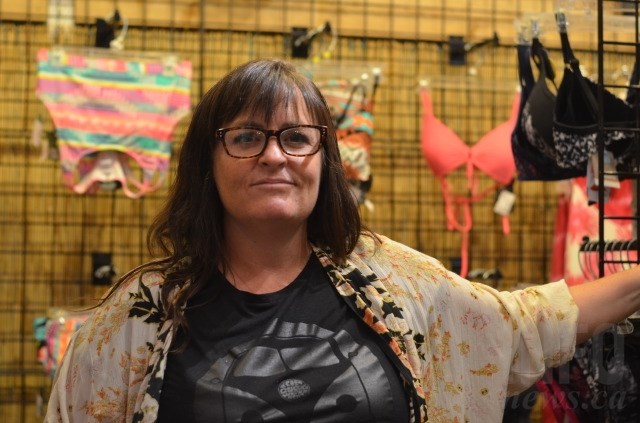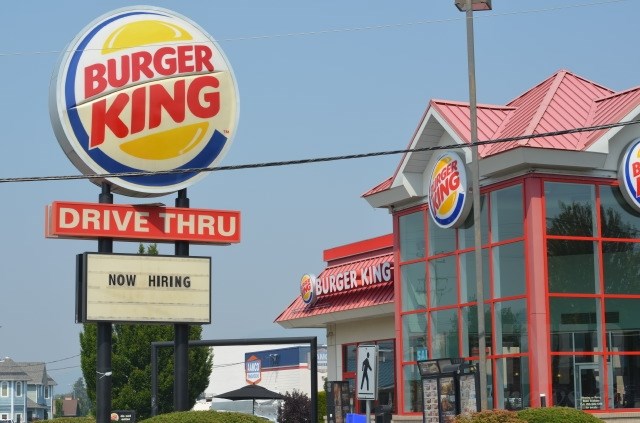
Lisa Gallie was forced to reduce her store's hours for the first time in 23 years.
(CHARLOTTE HELSTON / iNFOnews.ca)
August 11, 2017 - 1:18 PM
VERNON - Lisa Gallie used to get 50 to 70 resumes when she advertised a job opening at her Vernon business. Nowadays, she gets one, maybe two.
Gallie, the owner of Big Sun Beachwear and Tanning, says this is the first time in 23 years of business she’s had to reduce the store’s hours due to a widespread labour shortage in the region.
“Personally, it’s been rough for us,” Gallie says. “We’re having to step in and work hours that previously we had employees here.”
Last year, the family-owned and operated store had eight employees, including part-time positions. This summer, they have just three people, including Gallie.
“It’s leading to burnout,” she says. “I’ve got kids…. You can’t spend your whole summer at the store from 10 a.m. to 6 p.m. just trying to keep the doors open. Everyone suffers.”
She says people used to drop off resumes saying they were new to town and looking for work, but that hasn’t happened in about three years.
“It’s difficult because we’re having to shorten some hours, which is impossible to avoid when you’re on a skeleton staff and you’re in peak season,” Gallie says, adding she prides herself on excellent customer service and won’t hire just anyone. “Until the right person comes along, that’s what we have to do to survive.”
Big Sun isn’t the only local business struggling to find employees. Kim Lauritsen, the programs and operations manager at North Okanagan Community Futures, says numerous businesses are reporting labour challenges.

A 'now hiring' sign seen at the Vernon Burger King on July 31, 2017.
(CHARLOTTE HELSTON / iNFOnews.ca)
“We’re seeing with a lot of small businesses, owners themselves are having to run their business, and can only stay open because they are staying those extra hours,” Lauritsen says. “It’s taking a big toll on families.”
She says the trend became noticeable about six months ago and has been predominantly affecting the sales, trades, and transportation sectors. According to Lauritsen, the employment rate is currently at 74 per cent and there are just not enough workers to meet the demand. Last month, for instance, the Community Futures job board had 60 postings for jobs in sales and retail, 36 for trades and transportation, and 24 in administration.
“One of the challenges we hear from employers is we are losing our youth. We’re a smaller community, and a lot of the young people go to other centres,” Lauritsen says.
Another factor is that business has picked up in the north, prompting more people to move, Lauritsen says. The upswing in construction in the North Okanagan is also likely contributing to the trend, she says, noting that the trades could be taking workers away from other sectors.
Another reason could be that people are unable to participate in the labour market due to housing and childcare challenges, Lauritsen says.
Community Futures is is doing what it can to support employers through wage subsidies and educational workshops, including one focussed on how to attract millennials.
Lauritsen is also encouraging job seekers not to overlook retail sales jobs.
“A lot of times young people, the new generation, may not be looking at the retail sale sector as an entry level stepping stone, they might be trying to bypass it,” she says. “Those are the types of jobs that can create skills for any job.”
To contact a reporter for this story, email Charlotte Helston or call 250-309-5230 or email the editor. You can also submit photos, videos or news tips to the newsroom and be entered to win a monthly prize draw.
We welcome your comments and opinions on our stories but play nice. We won't censor or delete comments unless they contain off-topic statements or links, unnecessary vulgarity, false facts, spam or obviously fake profiles. If you have any concerns about what you see in comments, email the editor in the link above.
News from © iNFOnews, 2017